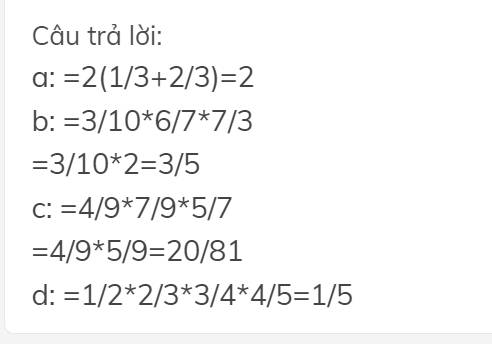( 1- 1/2 ) x ( 1 - 1/3 ) x ( 1 - 1/4 ) x .......x ( 1 - 1/9 )

Những câu hỏi liên quan
1. x+1/x-1 - x-1/x+1 = 4/x2-1
2. x+2/x-2 + x/x+2 = 2
3. 2x/x-1 - 1/x+2 = 2
4. x/x2-25 - 1-x/x-5 = 1/x+5
5. x-1/x+2 - 9/x2-4 = -3/x-2
6. 3x-3/x2-9 - 1/x-3 = x+1/x+3
Xem chi tiết
1) ĐKXĐ: \(x\notin\left\{1;-1\right\}\)
Ta có: \(\dfrac{x+1}{x-1}-\dfrac{x-1}{x+1}=\dfrac{4}{x^2-1}\)
\(\Leftrightarrow\dfrac{\left(x+1\right)^2}{\left(x-1\right)\left(x+1\right)}-\dfrac{\left(x-1\right)^2}{\left(x-1\right)\left(x+1\right)}=\dfrac{4}{\left(x-1\right)\left(x+1\right)}\)
Suy ra: \(x^2+2x+1-\left(x^2-2x+1\right)=4\)
\(\Leftrightarrow x^2+2x+1-x^2+2x-1=4\)
\(\Leftrightarrow4x=4\)
hay x=1(loại)
Vậy: \(S=\varnothing\)
2) ĐKXĐ: \(x\notin\left\{2;-2\right\}\)
Ta có: \(\dfrac{x+2}{x-2}+\dfrac{x}{x+2}=2\)
\(\Leftrightarrow\dfrac{\left(x+2\right)^2}{\left(x-2\right)\left(x+2\right)}+\dfrac{x\left(x-2\right)}{\left(x-2\right)\left(x+2\right)}=\dfrac{2\left(x^2-4\right)}{\left(x-2\right)\left(x+2\right)}\)
Suy ra: \(x^2+4x+4+x^2-2x=2x^2-8\)
\(\Leftrightarrow2x^2+2x+4-2x^2-8=0\)
\(\Leftrightarrow2x-4=0\)
\(\Leftrightarrow2x=4\)
hay x=2(loại)
Vậy: \(S=\varnothing\)
Đúng 2
Bình luận (0)
tìm x
a) X x 3/4 = 1/5 b) 3/7 x X = 2/5 c) 1/3 + 2/9 = 2/12 x X
d) 4/15 x X - 2/3 = 1/5 e) x : 1/7 = 2/3 f) 1/9 : x = 7/3 j) 1/4 + 5/12 = 8/3 : x
h) 7/4 : X - 1/2 = 1/5
a: x*3/4=1/5
=>x=1/5:3/4=1/5*4/3=4/15
b: x*3/7=2/5
=>x=2/5:3/7=2/5*7/3=14/15
c: 1/3+2/9=2/12x
=>1/6x=3/9+2/9=5/9
=>x=5/9*6=30/9=10/3
d: 4/15*x-2/3=1/5
=>4/15*x=2/3+1/5=10/15+3/15=13/15
=>4x=13
=>x=13/4
e: x:1/7=2/3
=>x=2/3*1/7=2/21
f: 1/9:x=7/3
=>x=1/9:7/3=1/9*3/7=3/63=1/21
j: 1/4+5/12=8/3:x
=>8/3:x=3/12+5/12=8/12=2/3
=>x=4
h: =>7/4:x=1/5+1/2=7/10
=>x=7/4:7/10=10/4=5/2
Đúng 2
Bình luận (1)
Câu nào trong các câu sau sai : ( 5 điểm )a) 1 hình vuông có tối đa 4 góc vậy 4 hình vuông tối đa 20 gócb) 1 hình vuông có tối đa 4 góc vậy 4 hình vuông tối đa 16 gócc) 1 hình vuông có tối thiểu 4 góc vậy 4 hình vuông có tối thiểu 16 gócd) 1 hình vuông có tối thiểu 1 góc vậy 4 hình vuông có tối thiểu 16 góce) 1 + 1 x 2 4viết tiếp vào chỗ chấm :( 2 điểm )a) 1 + 1 - 1 x 1 : 1 ...b) 2 + 2 x 2 - 2 : 2 ...c) 3 + 3 : 3 - 3 x 3 ...d) 1/1 + 1/1 x 2/2 ...Giải các câu sau : ( 3 điểm )a) 1 + 1 x 2 có...
Đọc tiếp
Câu nào trong các câu sau sai : ( 5 điểm )
a) 1 hình vuông có tối đa 4 góc vậy 4 hình vuông tối đa 20 góc
b) 1 hình vuông có tối đa 4 góc vậy 4 hình vuông tối đa 16 góc
c) 1 hình vuông có tối thiểu 4 góc vậy 4 hình vuông có tối thiểu 16 góc
d) 1 hình vuông có tối thiểu 1 góc vậy 4 hình vuông có tối thiểu 16 góc
e) 1 + 1 x 2 = 4
viết tiếp vào chỗ chấm :( 2 điểm )
a) 1 + 1 - 1 x 1 : 1 = ...
b) 2 + 2 x 2 - 2 : 2 = ...
c) 3 + 3 : 3 - 3 x 3 = ...
d) 1/1 + 1/1 x 2/2 = ...
Giải các câu sau : ( 3 điểm )
a) 1 + 1 x 2 có lớn hơn 1/1 + 1/1 x 2/2 ko ?( 1 điểm )
b) so sánh 9 + 9 - 9 x 9 : 9 với từng số sau : (9 + 9 x 9 - 9 : 9) ; (9 + 9 : 9 - 9 x 9) ; (1 + 1 x 1 : 1) ; (3 + 3 x 3 - 3 : 3) ( 2 điểm )
1.1 Hình vuông có tối đa 4 góc vậy 4 hình vuông có tối đa 20 góc. S
2.1 hình vuông có tối đa 4 góc vậy 4 hình vuông có tối đa 16 góc. Đ
3. 1 hình vuông có tối thiểu 4 góc vậy 4 hình vuông có tối thiểu 16 góc. Đ
4.1 hình vuông có tối thiểu 1 góc vậy 4 hình vuông có tối thiểu 16 góc. S
Nhiêu đó hết tài năng rồi, mình mới lớp 3 thôi.
Đúng 0
Bình luận (0)
1, ( x+1/3)^3
2, ( 2x+y^2)^3
3, ( 1/2x^2+1/3y)^3
4, ( 3x^2-2y)^3
5, ( 2/3x^2-1/2y)^3
6, ( 2x+1/2)^3
7, ( x-3)^3
8, ( x+1).(X^2+3x+9)
9, ( x-3).( x^2+3x+9)
10, ( x-2).( x^2+2x+4)
11, ( x+4).( x^2-4x+16)
12, ( x-3y).( x^2+3xy+9y^2)
13, ( x^2-1/3). ( x^4+1/3x^2+1/9)
14, ( 1/3x+2y).( 1/9x^2-2/3xy+4y^2)
Đưa về HĐT
Thực hiện phép tính:
a,4.(x+3)/3x2-x : x2+3x/1-3x
b, x+1/x2-2x-8 . 4-x/x2+x
c, 9x+5/2(x-1)(x+3)2- 5x-7/2(x-1)(x+3)2
d, 18/(x-3)(x2-9)-3/x^2-6x+9-x/x^2-9
e, 1/x2-x+1+1/1-x2+2/x3+1
Tính:
a) 2/3 : 1/2 + 1/3 : 1/2
b) 3/10 : 7/6 : 3/7
c) 4/9 x 7/9 : 7/5
d) (1 - 1/2) x (1 - 1/3) x (1 - 1/4) x (1 x 1/5)
Ai giải giúp đi, mình cần gấp
1.giải các phương trình sau:
a, 3(2x+1)/4 - 5x+3/6 = 2x-1/3 - 3-x/4
b, 19/4 - 2(3x-5)/5 = 3-2x/10 - 3x-1/4
c, x-2*3/2+3 + x-3*5/3+5 + x-5*2/5+2 = 10
d, x-3/5*7 + x-5/3*7 + x-7/3*5 = 2(1/3 + 1/5 + 1/7)
2. giải các phương trình:
a, x-1/9 + x-2/8 = x-3/7 + x-4/6
b, (1/1*2 + 1/2*3 + 1/3*4 + ... + 1/9*10) (x-1) + 1/10x = x- 9/10
Câu 1 :
a, \(\frac{3\left(2x+1\right)}{4}-\frac{5x+3}{6}=\frac{2x-1}{3}-\frac{3-x}{4}\)
\(\Leftrightarrow\frac{6x+3}{4}+\frac{3-x}{4}=\frac{2x-1}{3}+\frac{5x+3}{6}\)
\(\Leftrightarrow\frac{5x+6}{4}=\frac{9x+1}{6}\Leftrightarrow\frac{30x+36}{24}=\frac{36x+4}{24}\)
Khử mẫu : \(30x+36=36x+4\Leftrightarrow-6x=-32\Leftrightarrow x=\frac{32}{6}=\frac{16}{3}\)
tương tự
\(\frac{19}{4}-\frac{2\left(3x-5\right)}{5}=\frac{3-2x}{10}-\frac{3x-1}{4}\)
\(< =>\frac{19.5}{20}-\frac{8\left(3x-5\right)}{20}=\frac{2\left(3-2x\right)}{20}-\frac{5\left(3x-1\right)}{20}\)
\(< =>95-24x+40=6-4x-15x+5\)
\(< =>-24x+135=-19x+11\)
\(< =>5x=135-11=124\)
\(< =>x=\frac{124}{5}\)
\(\frac{\left(x-2\right).3}{2}+3+\frac{\left(x-3\right).5}{3}+5+\frac{\left(x-5\right).2}{5}+2=10\)
\(< =>\frac{\left(x-2\right).3.15}{30}+\frac{\left(x-3\right).5.10}{30}+\frac{\left(x-5\right).2.6}{30}=10-2-3-5\)
\(< =>\frac{\left(x-2\right).45+\left(x-3\right).50+\left(x-5\right).12}{30}=0\)
\(< =>45x-90+50x-150+12x-60=0\)
\(< =>107x-300=0< =>x=\frac{300}{107}\)
Xem thêm câu trả lời
1: 3/x+1 + 2/x+2 = 5x+4/x2+ 3x + 2
2: 2/3x + 1 - 15/6x2-x-1 = 3/2x - 1
3: 9/3x - 1 - 5-x/3x2-4x+1 = 4/x+ 1
4:5/x - 2 + 2/x+4 = 3x/x2 + 2x - 8
5: 4/x+6 + 1/x - 3 = 9/x2 + 3x - 18
6:x/x-3 - 2x2 +9/2x2 - 3x - 9= 1/2x + 3
\(\frac{3}{x+1}+\frac{2}{x+2}=\frac{5x+4}{x^2+3x+2}.\)ĐKXĐ: \(x\ne-1;-2\)
\(\Leftrightarrow\frac{3\left(x+2\right)}{\left(x+1\right)\left(x+2\right)}+\frac{2\left(x+1\right)}{\left(x+1\right)\left(x+2\right)}=\frac{5x+4}{\left(x+1\right)\left(x+2\right)}\)
\(\Leftrightarrow3x+6+2x+2=5x+4\)
\(\Leftrightarrow3x+2x-5x=-6-2+4\)
\(\Leftrightarrow0x=-4\)
=> PT vô nghiệm
\(2;\frac{2}{3x-1}-\frac{15}{6x^2-x-1}=\frac{3}{2x-1}\)
\(\Leftrightarrow\frac{2\left(2x-1\right)}{\left(2x-1\right)\left(3x-1\right)}-\frac{15}{6x^2+3x-2x-1}=\frac{3\left(3x-1\right)}{\left(2x-1\right)\left(3x-1\right)}\)
\(\Leftrightarrow\frac{4x-2-15}{\left(2x-1\right)\left(3x-1\right)}=\frac{9x-3}{\left(2x-1\right)\left(3x-1\right)}\)
\(\Leftrightarrow4x-2-15=9x-3\)
\(\Leftrightarrow4x-9x=2+15-3\)
\(\Leftrightarrow-5x=14\)
.....
Đúng 0
Bình luận (0)
mấy cái này mẫu nào dài cậu phân tích ra :
VD : câu 3 : \(3x^2-4x+1\)
\(=3x^2-3x-x+1\)
\(=3x\left(x-1\right)-\left(x-1\right)\)
\(=\left(3x-1\right)\left(x-1\right)\)
r bắt đầu giải PHương trình :)) Mấy câu còn lại tương tự
Đúng 0
Bình luận (0)
4; \(\frac{5}{x-2}+\frac{2}{x+4}=\frac{3x}{x^2+2x-8}.\)
\(\Leftrightarrow\frac{5\left(x+4\right)}{\left(x-2\right)\left(x+4\right)}+\frac{2\left(x-2\right)}{\left(x-2\right)\left(x+4\right)}=\frac{3x}{\left(x-2\right)\left(x+4\right)}\)
\(\Leftrightarrow5x+20+2x-4=3x\)
\(\Leftrightarrow4x=-16\Leftrightarrow x=-2\left(TM\right)\)
KL ::
\(5;\frac{4}{x+6}+\frac{1}{x-3}=\frac{9}{x^2+3x-18}\)
\(\Leftrightarrow\frac{4\left(x-3\right)}{\left(x+6\right)\left(x-3\right)}+\frac{x+6}{\left(x-3\right)\left(x+6\right)}=\frac{9}{\left(x-3\right)\left(x+6\right)}\)
\(\Leftrightarrow4x+x=3+9-6\)
\(\Leftrightarrow5x=6\Leftrightarrow x=\frac{6}{5}\)
Đúng 0
Bình luận (0)
Xem thêm câu trả lời
√x^2-6x+9=3-x
x^2-1/2x+1/16=x+3/2
√x-2√x-1=√x-1-1
√9-4√5-√5=-2
Let's solve each equation step by step:
√(x^2 - 6x + 9) = 3 - xSquaring both sides of the equation, we get:
x^2 - 6x + 9 = (3 - x)^2
x^2 - 6x + 9 = 9 - 6x + x^2
The x^2 terms cancel out, and we are left with:
-6x = -6x
This equation is true for any value of x. Therefore, there are infinitely many solutions.
x^2 - (1/2)x + 1/16 = x + 3/2Moving all terms to one side of the equation, we get:
x^2 - (1/2)x - x + 3/2 - 1/16 = 0
x^2 - (3/2)x + 29/16 = 0
To solve this quadratic equation, we can use the quadratic formula:
x = (-b ± √(b^2 - 4ac)) / (2a)
In this case, a = 1, b = -3/2, and c = 29/16. Plugging in these values, we get:
x = (3/2 ± √((-3/2)^2 - 4(1)(29/16))) / (2(1))
x = (3/2 ± √(9/4 - 29/4)) / 2
x = (3/2 ± √(-20/4)) / 2
x = (3/2 ± √(-5)) / 2
Since the square root of a negative number is not a real number, this equation has no real solutions.
√(x - 2)√(x - 1) = √(x - 1) - 1Squaring both sides of the equation, we get:
(x - 2)(x - 1) = (x - 1) - 2√(x - 1) + 1
x^2 - 3x + 2 = x - 1 - 2√(x - 1) + 1
x^2 - 4x + 2 = -2√(x - 1)
Squaring both sides again, we get:
(x^2 - 4x + 2)^2 = (-2√(x - 1))^2
x^4 - 8x^3 + 20x^2 - 16x + 4 = 4(x - 1)
x^4 - 8x^3 + 20x^2 - 16x + 4 = 4x - 4
Rearranging terms, we have:
x^4 - 8x^3 + 20x^2 - 20x + 8 = 0
This equation does not have a simple solution and requires further calculations or approximation methods to find the solutions.
√9 - 4√5 - √5 = -2Simplifying the left side of the equation, we get:
3 - 4√5 - √5 = -2
-√5 - 5 = -2
-√5 = 3
This equation is not true since the square root of a number cannot be negative.
Therefore, the given equations either have infinitely many solutions or no real solutions.
Đúng 0
Bình luận (0)
Bài 1: rút gọn a. ( x + 1)^2 - (x - 1)^2 - 3(x + 1)(x - 1)b. 5(x +2)(x -2) - 1/2(6 - 8x)^2 + 17c. (x^2 - 1)^3 - (x^4 + x^2 + 1)(x^2 - 1)d. (x^4 - 4x^2 +9)(x^2 + 3) - (3 + x^2)^3e. (x-3)^3 -(x - 3)(x^2 +3x + 9) + 6(x + 1)^2Bài 2: tìm xa. 25x^2 - 9 0b. (x + 4)^2 - (x + 1) (x -1) 16c. (2x - 1)^2 + (x + 3)^2 - 5(x + 7)(x - 7) 0d. (x + 2)(x^2 - 2x + 4) - x(x^2 + 2) 15e. (x + 3)^3 - x(3x + 1)^2 + (2x + 1)(4x^2 - 2x + 1) 28g. (x^2 - 1)^3 - (x^4 + x^2 + 1)(x^2 -1) 0HELP ME!!!!!!!!
Đọc tiếp
Bài 1: rút gọn
a. ( x + 1)^2 - (x - 1)^2 - 3(x + 1)(x - 1)
b. 5(x +2)(x -2) - 1/2(6 - 8x)^2 + 17
c. (x^2 - 1)^3 - (x^4 + x^2 + 1)(x^2 - 1)
d. (x^4 - 4x^2 +9)(x^2 + 3) - (3 + x^2)^3
e. (x-3)^3 -(x - 3)(x^2 +3x + 9) + 6(x + 1)^2
Bài 2: tìm x
a. 25x^2 - 9 = 0
b. (x + 4)^2 - (x + 1) (x -1) = 16
c. (2x - 1)^2 + (x + 3)^2 - 5(x + 7)(x - 7) = 0
d. (x + 2)(x^2 - 2x + 4) - x(x^2 + 2)= 15
e. (x + 3)^3 - x(3x + 1)^2 + (2x + 1)(4x^2 - 2x + 1) = 28
g. (x^2 - 1)^3 - (x^4 + x^2 + 1)(x^2 -1) = 0
HELP ME!!!!!!!!
Bn gửi từng câu sẽ có nhều ng trl hơn nhé
tý mk giải câu a cho cần ko






















